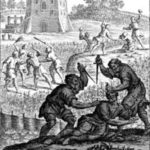We run our website the way we wished the whole internet worked: we provide high quality original content with no ads. We are funded solely by your direct support. Please consider supporting this project.
Is Non-Violence a Key to Christian Discipleship?
For the first three centuries of the church, Christians understood that forgoing the use of violence and expressing God’s self-sacrificial love was central to discipleship. However, this mindset changed after the Church acquired power in the fourth century. Entire theological systems have been developed to support the use of coercive power. However, contrary to that teaching, the New Testament is as clear as can be that Kingdom people are called to follow Jesus’ example of sacrificing himself for enemies rather than resorting to violence to resist or to conquer them.
Paul commands us to “follow God’s example” and to “walk in the way of love, just as Christ loved us and gave himself up for us” — while we were yet enemies of God (Ephesians 5:1–2; Romans 5:10). Paul elsewhere tells us that in our relations we are to “have the same attitude of mind Christ Jesus had” (Philippians 2:5). Though he was “in very nature of God,” he didn’t cling to his status. Rather, for our sake he set aside his divine prerogatives, took on the nature of a servant, and “humbled himself by becoming obedient to death — even death on a cross!” (Philippians 2:6–8).
Along the same lines, Peter encourages us to be willing to suffer injustice out of “reverent fear of God,” for “it is commendable if you bear up under the pain of unjust suffering because you are conscious of God” (1 Peter 2:18–19). He then adds, “to this you were called, because Christ suffered for you, leaving you an example, that you should follow in his steps” (vs. 21). When people “hurled their insults at him,” Peter continues, “he did not retaliate; when he suffered, he made no threats.” Instead, Peter says, “he entrusted himself to him who judges justly” (vs. 23).
This is the example Peter says we are to follow, and it precludes picking up the sword even though one might be justified, by normal worldly standards, for doing so.
Paul teaches the same thing when he tells Christians to never “repay anyone evil for evil” (Romans 12:17, 1 Thessalonians 5:15; 1 Peter 3:9) and to never “take revenge… but leave room for God’s wrath, for it is written, ‘It is mine to avenge; I will repay,’ says the Lord.” (Romans 12:18). Knowing that God alone has the right to pass judgment on people, and remaining confident that God will do this in his own time and by his own means, Kingdom people are commanded and empowered to refrain from ever exacting judgment on their own.
This doesn’t mean it’s appropriate for a Kingdom person to enjoy ruminating about the future judgments of his enemies. Such an attitude reflects a hostility in the heart that has no place in the life of a Kingdom person (Ephesians 4:29–31). Our attitude toward enemies is rather to be that of Jesus who with his last dying breath prayed that his father would forgive his persecutors (Luke 23:34).
Paul and Peter are simply pointing out that Kingdom people are to be confident that, if an enemy needs to be punished, God will do it in due time. Following the example of Jesus, therefore, we are to relinquish all judgment to God and simply self-sacrificially love those who treat us, or our loved ones, unjustly.
Peter returns to the example of Christ in the next chapter of his epistle when he encourages people who are facing persecution to “revere Christ as Lord” in “their hearts” by responding to their persecutors with “gentleness and respect.” Following the example of Christ who “suffered once for sins, the righteous for the unrighteous, to bring [them] to God” (1 Peter 3:15), followers of Jesus are to maintain a gentle, loving attitude so that “those who speak maliciously against [their] good behavior in Christ may be ashamed of their slander” (vs. 16).
If ever one would be justified in using violence to protect oneself, it’s when they’re being persecuted for doing good. Yet followers of Jesus are to do what Jesus did in these circumstances. We’re to choose to suffer on behalf of the persecutor instead of retaliating.
The author of Hebrews hits on the same theme when he encourages disciples undergoing persecution to fix “[their] eyes on Jesus, the pioneer and perfecter of faith” who “endured the cross, scorning it shame” (Hebrews 12:2). “Consider him,” he continues, “who endured such opposition from sinners,” for in contemplating Jesus example these Christians would “not grow weary and lose heart” (vs. 3).
The example of Jesus’ willingness to suffer rather than violently resist enemies is not just relevant to people facing possible martyrdom. Instead, this example is to characterize our entire life. “Whoever claims to live in him must live as Jesus did “(1 John 2:6). As “Jesus Christ laid down his life for us,” John says, “we ought to lay down our lives for one another” (1 John 3:16).
As MennoNerds, we all have found certain distinctives of Anabaptism to be central in our expression of faith. This article is part of a MennoNerds Synchro-Blog in the month of May on Anabaptism.
To find all the other articles in the Mennonerds on Anabaptism synchro blog click here.
Category: Q&A
Tags: Mennonerds, Non-Violence, Peacemaking, Violence
Topics: Enemy-Loving Non-Violence
Related Reading

Podcast: How Can I Protect My Kids from the Violence in Media?
Greg looks at ways to help strengthen non-violence in children in a world saturated in violence. http://traffic.libsyn.com/askgregboyd/Episode_0308.mp3

Podcast: If You Could’ve Killed Hitler, Wouldn’t You?
Greg challenges the intuitively appealing notion of killing Hitler and thereby preventing the massacre of millions of people. http://traffic.libsyn.com/askgregboyd/Episode_0326.mp3 —Edvard Munch, “The Murderer,” 1910

What Do We Do About Violence That Is Already Here? That We Were Born Into?
In this episode Greg Talks About Becoming Non-Violent in a World Soaked in Violence. Episode 30 http://traffic.libsyn.com/askgregboyd/Episode_0030.mp3

The Violent Vineyard Owner: A Response to Paul Copan (#8)
In my previous post I addressed two of the three parables that Paul Copan argues present God in violent ways. Today I will address the third, which is the parable of a vineyard owner with hostile tenants (Matthew 21:33-41; Luke 20:9-13). This parable differs from the previous two parables. Whereas the previous parables deal with…

The Violent “Church Triumphant”
In light of how central enemy-loving non-violence is to Jesus’ teaching and to his cross-centered revelation of God, we have to wonder why the church has refused to listen to its head and instead condoned violence, as pointed out in the previous post? Christian theologians have used OT’s violent portraits of God, at least since…

Why Are We So Mired in Violence?
In his marvelous little book entitled The Great Divorce, C. S. Lewis envisioned hell as a realm in which people are forever moving farther away from one another. Hell is the ultimate, cosmic, suburban sprawl! It seems to me that Western civilization is diving headlong into Lewis’ hell, and we’re being pulled there by the…
